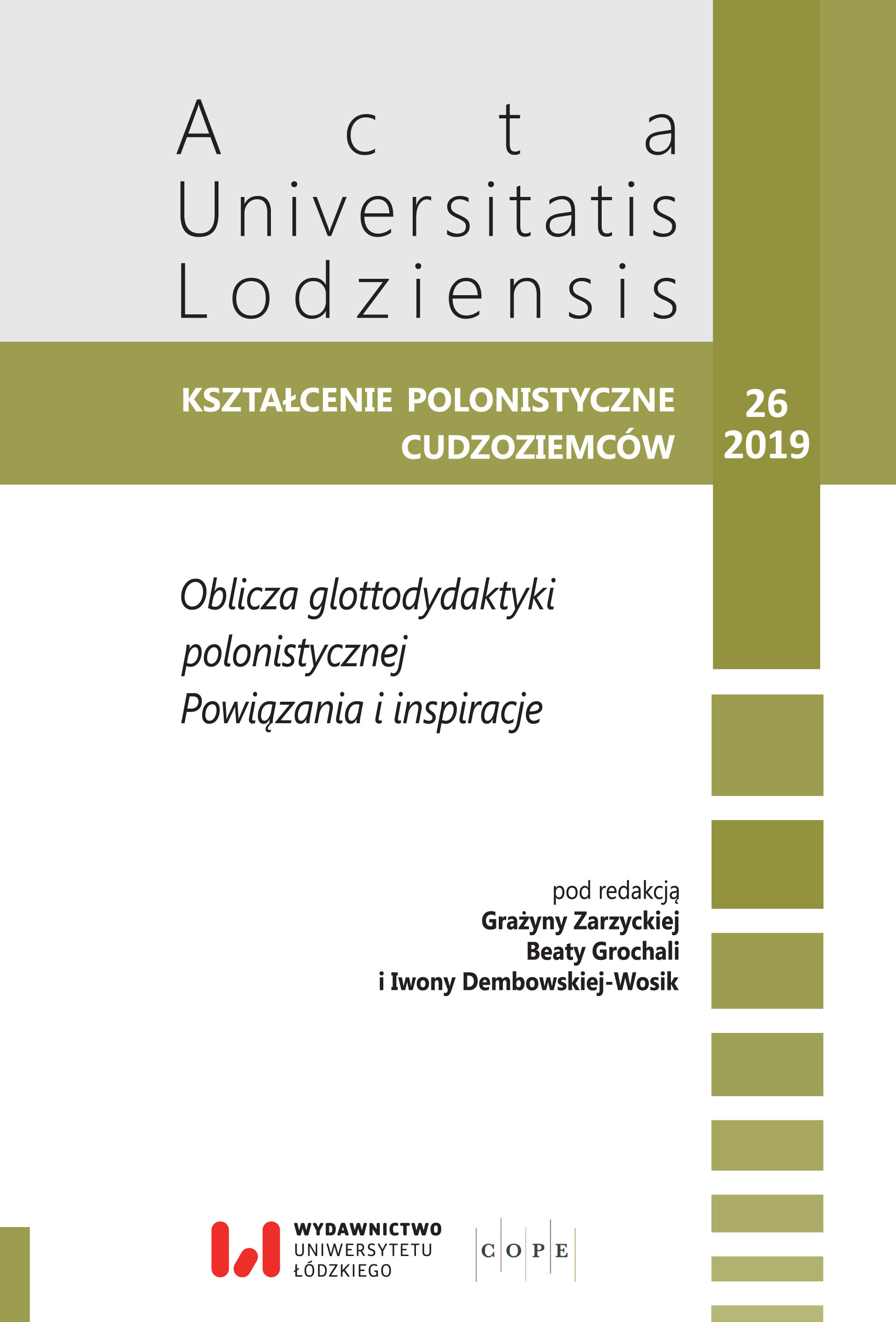Media społecznościowe w nauczaniu języków obcych – przegląd prac
DOI:
https://doi.org/10.18778/0860-6587.26.09Słowa kluczowe:
media społecznościowe, autonomia, interakcja, komunikacja, tożsamość, FacebookAbstrakt
Celem powyższego artykułu jest ukazanie, dlaczego i w jaki sposób media społecznościowe okazują się przydatnym narzędziem w nauczaniu języków obcych. Za ramę teoretyczną przyjęto konstrukcjonizm społeczny i badania Vygotskiego. Jedną z kluczowych zalet tego typu mediów jest ich szeroka dostępność. Uwagę zwrócono także na społeczny wymiar zachodzących tam interakcji, co pomaga w nadaniu nauce języka obcego charakteru współpracy w obrębie określonej wspólnoty. Konieczność częstego, samodzielnego negocjowania znaczeń oraz daleko idąca swoboda (autonomia) w tworzeniu własnego wizerunku i dostrajaniu nauczanych treści do własnych potrzeb wzbogacają proces nauki języka obcego i owocują większą motywacją. W ostatniej części artykułu wyliczono przykłady praktycznego zastosowania mediów społecznościowych w nauczaniu.
Bibliografia
Austin R., Anderson J., 2010, Building Bridges Online: Issues of Pedagogy and Learning Outcomes, in: L. Tomei (ed.), Intercultural Education Through Citizenship, Chapter 1, New York, pp. 189–198.
Google Scholar
Blattner G., Lomicka L., 2012, Facebook-ing and the Social Generation: A New Era of Language Learning, “Alsic [En ligne]”, vol. 15, no. 1, https://doi.org/10.4000/alsic.2413
Google Scholar
boyd d. m., Ellison, N., 2007, Social Network Sites: Definition, History, and Scholarship, “Journal of Computer-Mediated Communication” 17, December, pp. 210–230, https://doi.org/10.1111/j.1083-6101.2007.00393.x
Google Scholar
Conole G., 2010, Personalisation through Technology-Enhanced Learning, in: John O’Donoghue (ed.), Technology-Supported Environments for Personalized Learning: Methods and Case Studies, Information, Science, Reference, New York, pp. 1–14.
Google Scholar
Csíkszentmihályi, M., (1991), Flow: The Psychology of Optimal Experience. Steps Toward Enhancing the Quality of Life, Philadelphia.
Google Scholar
Downes S., 2010, Learning Networks and Connective Knowledge, in: H. Hao Yang, S. Chi-Yin Yuen (ed.), Collective Intelligence and E-Learning 2.0: Implications of Web-Based Communities and Networking. New York, pp. 1–26.
Google Scholar
Dörnyei Z., Hadfield, J., 2014, Motivating Learning, London–New York.
Google Scholar
Erben T., Ban R., Castañeda M., 2008, Teaching English Language Learners through Technology, London–New York.
Google Scholar
Harrison R., Thomas M., 2009, Identity in online communities: social networking sites and language learning, “International Journal of Emerging Technologies and Society”, no. 7(2). pp. 109–124.
Google Scholar
Huang H., Cordella M., Browning C., Baumgartner R., 2016, An Innovative Model for Second Language Learning and Social Inclusion, in: M. Cordella, H. Huang (ed.), Rethinking Second Language Learning: Using Intergenerational Community Resources, Bristol, pp. 226–237.
Google Scholar
McBride K., 2009, Social-Networking Sites in Foreign Language Classes: Opportunities for Re-creation, “The next generation: Social networking and online collaboration in foreign language learning”, vol. 8, Chapter 3, pp. 35–58.
Google Scholar
Mondahl M., Razmerita L., 2014, Social media, Collaboration and Social Learning – a Case-study of Foreign Language Learning, “The Electronic Journal of e-Learning”, vol. 12, issue 4, pp. 339–352.
Google Scholar
Moran M., Seamann J., Tanti-Kane H., 2011, Teaching, Learning, and Sharing: How Today’s Higher Education Faculty Use Social Media, Boston.
Google Scholar
Newland B., Papaefthimiou M. C., 2010, e-learning: Institutional Provision and Student Expectations, in: J. O’Donoghue (ed.), Technology-Supported Environments for Personalized Learning: Methods and Case Studies, New York, pp. 74–90.
Google Scholar
Promnits-Hayashi L., 2011, A learning success story using Facebook, “Studies in Self-Access Learning Journal”, no. 2(4), pp. 309–316.
Google Scholar
Rivers D., Houghton S. A., 2013, Identities in Foreign Language Education, in: D. J. Rivers, S. A. Houghton, Social Identities and Multiple Selves in Foreign Language Education, London, pp. 1–13.
Google Scholar
Royal, C., 2011, Thinking Critically About New Media, in: R. O’Connell (ed.), Teaching with Multimedia. Pedagogy in the Websphere, vol. 1, Creskill, New Jersey, pp. 13–30.
Google Scholar
Snyder Ohta A., (2009). Second Language Learning Acquisition Process in the Classroom: Learning Japanese. New York.
Google Scholar
Talaue G. M. et al, 2018, The Impact of Social Media on Academic Performance of Selected College Students, “International Journal of Advanced Information Technology (IJAIT)”, vol. 8, no. 4/5, pp. 27–35.
Google Scholar
Wang Q., Huay Lit Woo, Choon Lang Quek, Yuqin Yang, Mei Liu, 2011, Using the Facebook group as a learning management system: An exploratory study, “British Journal of Educational Technology”, https://doi.org/10.1111/j.1467-8535.2011.01195.x
Google Scholar
Wenger E., 2006, Communities of Practice: A Brief Introduction, www.ewenger.com/pub/pubpapers.htm [28.08.2019].
Google Scholar
Willging, P., 2008, Online Interactions: Comparing Social Network Measures with Instructors’ Perspectives, in: R. Zheng, S. Pixy Ferris (eds.), Understanding Online Instructional Modeling. Theories and Practices, New York, pp. 150–167.
Google Scholar
Wlodkowski, R. J., Ginsberg, M. B., 2010, Teaching Intensive and Accelerated Courses. Instruction That Motivates Learning, San Francisco.
Google Scholar
Wood, C., 2010, Science for Everyone. Visions for Near-Future Educational Technology, in: L. Tomei (ed.), ICTs for Modern Educational and Instructional Advancement: New Approaches to Teaching, New York, chapter 29, pp. 344–354.
Google Scholar
Yim S., Warschauer M., 2019, Student Initiating Feedback: The Potential of Social Media, in: K. Hyland, F. Hyland (eds.), Feedback in Second Language Writing: Contexts and Issues, Cambridge, pp. 285–304.
Google Scholar
Global Web Index Social Media Flagship, https://www.globalwebindex.com/hubfs/Downloads/Social-H2-2018-report.pdf [12.05.2019].
Google Scholar
https://newsroom.fb.com/company-info/#statistics [12.05.2019].
Google Scholar
https://www.statista.com [12.05.2019].
Google Scholar
https://zephoria.com/top-15-valuable-facebook-statistics/ [12.05.2019]
Google Scholar
Pobrania
Opublikowane
Jak cytować
Numer
Dział
Licencja

Utwór dostępny jest na licencji Creative Commons Uznanie autorstwa – Użycie niekomercyjne – Bez utworów zależnych 4.0 Międzynarodowe.










